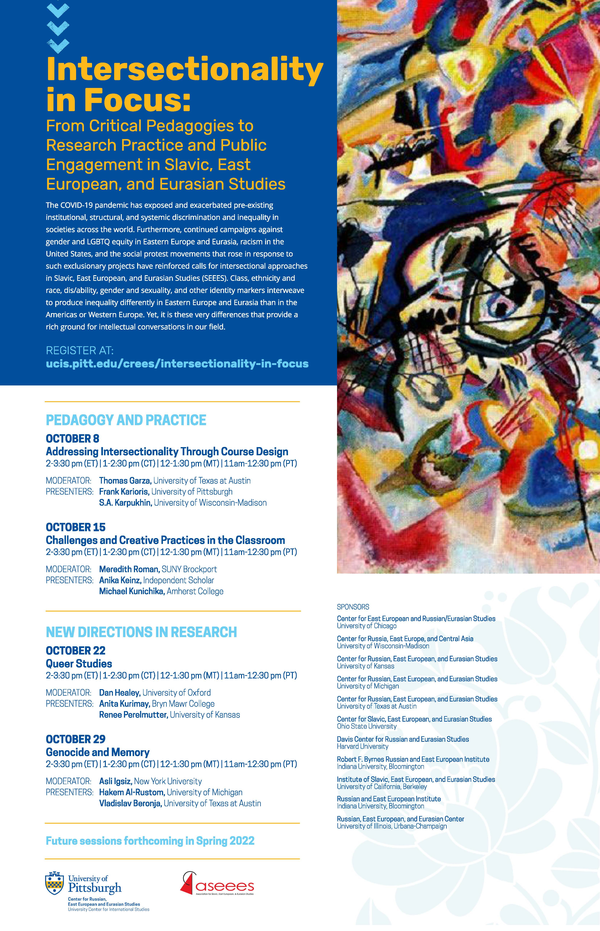
ASEEES - Pitt Intersectionality in Focus Series: "Imperial Pasts in the Present: Affect, Indigeneity, and Memory"
- Event Type
- Seminar/Symposium
- Sponsor
- Association for Slavic, East European, and Eurasian Studies Committee for Advocating for Diversity and Inclusion; University of Pittsburgh Center for Russian, East European, and Eurasian Studies; University of Chicago Center for East European and Russian/Eurasian Studies; University of Wisconsin Center for Russia, East Europe, and Central Asia; University of Kansas Center for Russian, East European, and Eurasian Studies; University of Michigan Center for Russian, East European, and Eurasian Studies; University of Texas Center for Russian, East European, and Eurasian Studies; Ohio State University Center for Slavic, East European, and Eurasian Studies; Harvard University Davis Center for Russian and Eurasian Studies; Indiana University Inner Asian and Uralic National Resource Center; University of California Institute of Slavic, East European, and Eurasian Studies; University of Illinois Russian, East European, and Eurasian Center; Indiana University Robert F. Byrnes Russian and East European Institute
- Virtual
- Join online
- Date
- Oct 29, 2021 1:00 - 2:30 pm
- Cost
- Free and open to the public.
- Registration
- Registration
- Contact
- REEEC
- reec@illinois.edu
- Views
- 72
- Originating Calendar
- Russian, E. European & Eurasian Center: Co-sponsored Events
Part of the online series, Intersectionality in Focus: From Critical Pedagogies to Research Practice and Public Engagement in Slavic, East European, and Eurasian Studies
The COVID-19 pandemic has exposed and exacerbated pre-existing institutional, structural, and systemic discrimination and inequality in societies across the world. Furthermore, continued campaigns against gender and LGBTQ equity in Eastern Europe and Eurasia, racism in the United States, and the social protest movements that rose in response to such exclusionary projects have reinforced calls for intersectional approaches in Slavic, East European, and Eurasian Studies (SEEES). Class, ethnicity and race, dis/ability, gender and sexuality, and other identity markers interweave to produce inequality differently in Eastern Europe and Eurasia than in the Americas or Western Europe. Yet, it is these very differences that provide a rich ground for intellectual conversations in our field.
OCTOBER 29
Imperial Pasts in the Present: Affect, Indigeneity, and Memory
2-3:30 pm (ET) | 1-2:30 pm (CT) | 12-1:30 pm (MT) | 11am-12:30 pm (PT)MODERATOR:
Aslı Iğsız is Associate Professor of Middle Eastern and Islamic Studies at New York University. She earned a Ph.D. in Comparative literature from the University of Michigan. Professor Iğsız's book Humanism in Ruins: Entangled Legacies of the Greek-Turkish Population Exchange (Stanford University Press) uses the management of difference to explore racialized logics of population transfers, partitions, segregation, apartheid, and border walls. Her primary research interests are political violence, eugenics, humanism, spatial segregation, forced migration, and cultural policy. Prof. Iğsız is currently a Fellow at the School of Social Science at the Institute for Advanced Study in Princeton on a project that focuses on the notion of fascist utopias in the contemporary world.
PRESENTERS:
Hakem Al-Rustom is the Alex Manoogian Professor of Modern Armenian History and Assistant Professor of Anthropology at the University of Michigan. Professor Al-Rustom earned his Ph.D. from the London School of Economics in Social Anthropology. His main research interests are the anthropology of history, examining the relationships between indigenous populations and settler colonialists, migration and displacement, historical ethnographies, and silences and absences in post-Ottoman societies. Professor Al-Rustom is currently working on a book on the unwritten histories of the Armenian citizens of Turkey to depict the history of indigenous populations that continue to face erasures in the wake of the establishment of nation-states.
Vladislav Beronja is Assistant Professor of Slavic and Eurasian Studies at the University of Texas at Austin. He received a Ph.D. in Slavic Languages & Literatures from the University of Michigan in Ann Arbor. Professor Beronja's primary research interests range from contemporary comics and popular music to postmodern metafiction, psychoanalytical approaches to trauma, and Marxist aesthetics. He has published and edited many articles, book reviews, and translations. Prof. Beronja's current book project "Archival Fictions: Cultural Memory, Literary Imagination, and the Yugoslav Wars" examines how post-Yugoslav writers and artists critically deploy the archive as a governing metaphor for the loss and preservation of cultural memory in post-Communist Eastern Europe. Professor Beronja's courses highlight literature, cinema, music, and cultural identity in the Balkans; modern warfare and comics; and nostalgia and popular culture in Eastern Europe and the United States.